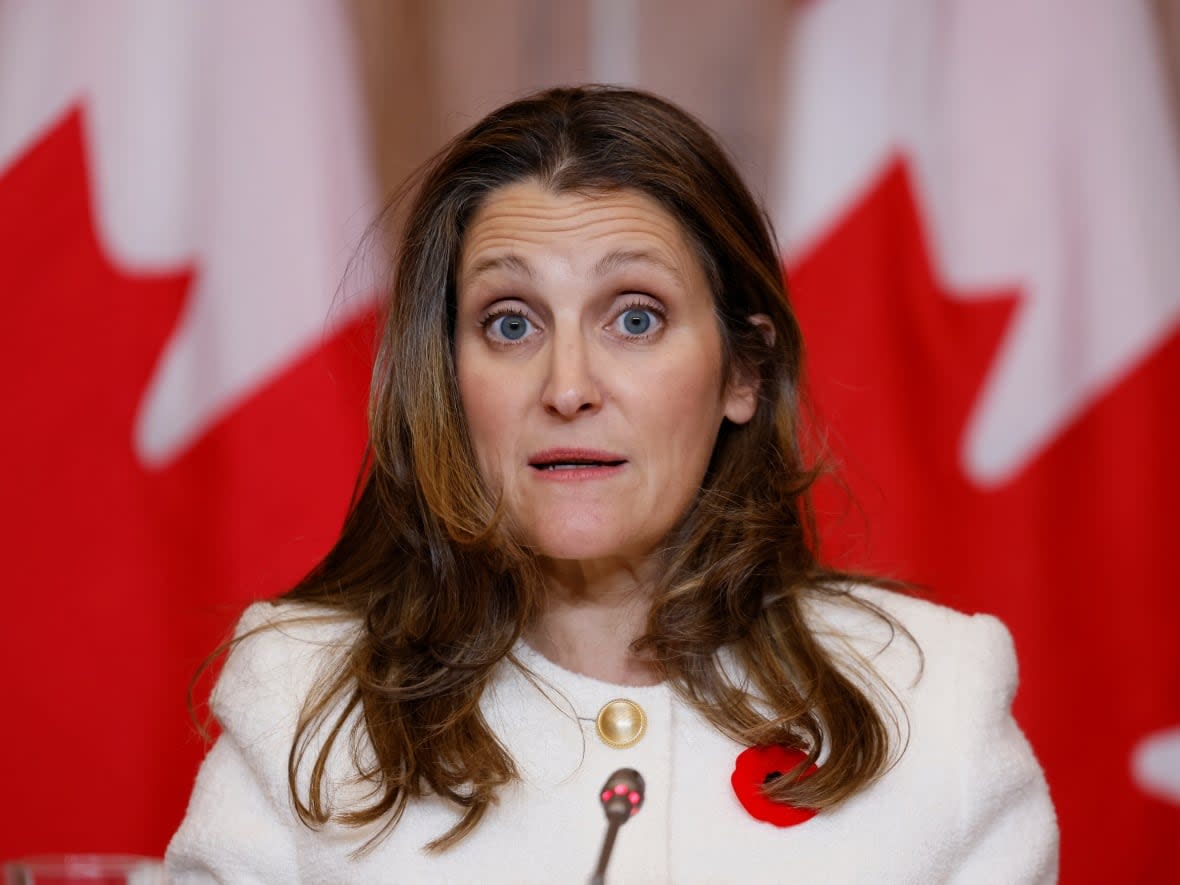Freeland says budget will offer measures to help the vulnerable — but it can't help everyone

Finance Minister Chrystia Freeland says next week's budget will offer targeted measures to help Canadians squeezed by rising interest rates and inflation — but she warns the federal government can't afford to help everyone.
"For those Canadians who feel the bite of rising prices the most acutely, for our most vulnerable friends and neighbours, our government will deliver additional targeted inflation relief," Freeland said in Oshawa, Ont. on Monday.
"This support will be narrowly focused and fiscally responsible. The truth is we can't fully compensate every single Canadian for all of the effects of inflation or for elevated interest rates. To do so would only make inflation worse and force rates higher for longer."
Freeland said next week's budget is designed to avoid making inflation worse while still making significant investments in health care and in building "Canada's clean economy."
"By exercising fiscal restraint, and by not pouring fuel on the fire of inflation today, we will ensure we can responsibly invest in Canadians and in a Canadian economy for years to come," she said.
Asked to describe specific measures in the coming budget, Freeland said Canadians will have to wait until March 28 for the details.
Freeland said that while the slowing global and Canadian economies leave her with less revenue to offset negative economic impacts, Canada is still in good economic shape compared to other G7 nations.
She said the budget will embrace restraint because the combined impacts of an economic slowdown and the cost of providing economic supports during the pandemic means the federal government's "ability to spend is not infinite."
Watch: Government will deliver 'additional targeted inflation relief': Freeland:
Freeland said the budget will cover two "significant and necessary" investments. The first is the federal government's 10-year $198 billion health care plan.
The deal, pitched by the federal government as a generational fix for an ailing health-care system, begins with provinces and territories getting an unconditional $2-billion boost to the Canada Health Transfer (CHT) to cover immediate measures to address hospital backlogs and overflowing pediatric hospitals.
The deal also includes a five per cent annual hike to the CHT for the next five years, with a built-in mechanism to permanently increase funding in the years after.
The budget's second major investment is in the transition to a clean economy, she said.
"Together, these two fundamental shifts represent a huge economic opportunity for Canada and for Canadian workers," she said.
Building that future economy, Freeland said, means redirecting global supply chains away from dictatorships and through countries friendly to Canada. She said Canada is well placed to become part of a friendly global supply chain.
"From energy to critical minerals, Canadian workers can be the ones to provide our allies with the resources they need, and Canadian communities can reap the benefits," she said.
Freeland was asked how she can promise to be fiscally responsible when she has to compete with the tax credits in U.S. President Joe Biden's Inflation Reduction Act. The credits are meant to ramp up investment in the clean economy south of the border.
Last fall, a senior federal finance department official called the U.S. tax credits a "game-changer for climate transition" and warned they would amount to "a gravitational black hole," drawing capital to the U.S. at the expense of Canada and other countries.
Freeland tabled an initial response to those challenges in last fall's economic statement: tax credits for clean energy capital costs and for hydrogen production. Those credits were backstopped by the promise of further action in the 2023 budget.
On Monday, Freeland said much more is coming.
"Investments in our economic capacity are fiscally responsible and failure to make the necessary investments in our economic capacity and in our economic future, that is irresponsible and that is reckless," Freeland said.
"We have a choice. Either we also can invest aggressively in the clean economy of the 21st century, in a smart focused Canadian way, or we can be left behind."


